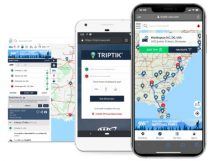LOUISVILLE, Ky. — Patients at five Baptist Health hospitals will soon benefit from a same-day procedure to diagnose and treat lung cancer using robot-assisted technology.
Baptist Health Floyd was the first to begin using the Ion™ endoluminal system in February and has performed 16 robotic bronchoscopy procedures. The robotic bronchoscopy program will be phased in at Baptist Health Louisville, Baptist Health Hardin, Baptist Health Lexington and Baptist Health Paducah.
“A robotic bronchoscopy is an approach that helps us safely and quickly access lesions or nodules deeper in the lung, near a major blood vessel or a portion of an already diseased lung,” said Angela Mahan, MD, a Baptist Health Medical Group thoracic surgeon and system medical director for thoracic oncology.
“With this system, we can catch small lung cancers in the early, most treatable stages and avoid subsequent biopsies. The earlier the diagnosis, the sooner we can begin treatment, giving patients their best chance at a longer life.”
The robotic approach also benefits those with other health concerns, such as severe lung disease or active smoking, which can increase infection risk or other rare complications associated with more traditional biopsy options.
Biopsies involve removing a tiny piece of tissue from the suspicious area and are typically performed to diagnose lung issues such as cancer. The biopsy can determine whether nodules or masses are malignant (cancerous) or benign (noncancerous).
Robotic bronchoscopy uses an ultra-thin, flexible tube with a camera, going in the nose or mouth and through narrow airways in the lung to the lesion. The catheter can move 180 degrees in all directions and navigate through the lungs to reach nodules in any airway segment.
Once the nodule is reached, the catheter is locked into place and a needle collects tissue from the mass or nodule. The outpatient procedure, performed under general anesthesia, takes one to two hours. Patients usually go home the same day with some soreness or numbness in the mouth and throat.
“Baptist Health is investing in leading-edge cancer care solutions such as robotic bronchoscopy to help detect lung cancer earlier when more effective treatment options are available,” said Amanda Henson, Baptist Health system vice president of service lines. “We want people to know that if they choose Baptist Health for their lung issues, they can access a higher level of care.”
Lung cancer is the leading cause of death among men and women in the United States. There are no symptoms in the disease’s early and most curable stages. With early detection and prompt surgical treatment, the cure rate is 92 percent.
An annual lung CT screening test using a low radiation dose can detect cancer when it’s small. The non-invasive screening is recommended for those most at risk for lung cancer: those over age 50 who have smoked, those who once smoked heavily but quit, those with a history of lung cancer, and those with other risk factors such as exposure to asbestos or who have the chronic obstructive pulmonary disease (COPD). All Baptist Health hospitals offer lung CT screening.
Baptist Health has partnered with Ion’s maker previously. Ion is made by Intuitive, the company that makes the da Vinci® surgical system, and is built on more than two decades of leadership in robot-assisted technology. Baptist Health currently has da Vinci robotic surgical systems at six owned hospitals.





